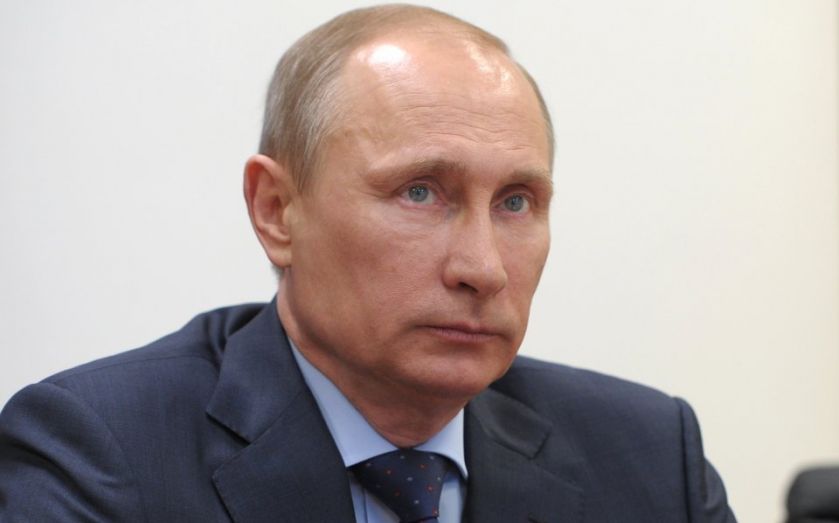3 things Putin probably hadn’t bargained for

It seems Vladimir Putin, upon whom everyone’s been keeping more than half an eye, is backing off.
Following the beating the Russian stock market and currency took yesterday, the Russian leader's been speaking at a news conference. He told reporters this morning that there’s no – current – need for military force in Ukraine, that he doesn’t recognise the legitimacy of interim president Oleksandr Turchynov, and the current situation is tantamount to an unconstitutional coup.
For the time being, it looks like Putin’s words have had a soothing effect on the Moscow stock market, which suffered the enormous loss of 10.8 per cent yesterday. Today, the Micex has recovered almost half of the losses, climbing up over five per cent. It's currently up just over two per cent.
But be that as it may, not everything in the current crisis has gone to plan for Putin.
Financial fallout
Market and currency crash
It doesn’t look like anyone really bargained for the calamitous day markets had yesterday.
The astonishing losses were the backlash of investors rushing to safe-haven assets – Micex's was a pre-economic crisis-sized plummet. Russia's rouble also fell – to an all-time low against both the dollar and the euro.
Hiking interest rates
The flailing currency saw the Russian central bank hike its benchmark interest rate from 5.5 per cent to seven per cent to try and protect it.
Then, news broke that it had spent $10bn (£6bn) of foreign currency reserves to the same ends. To put that into perspective: it’s two per cent of the country’s $498bn foreign exchange reserves, which had already fallen from $509bn at the end of 2013.
Too many occasions warranting action at that pace would not be sustainable.
Capital Flight
And, of course, if people carry on bailing out of the currency, it’ll lead to capital flight, with the rouble sliding on foreign exchange markets.
The threat of US sanctions of Russia prompted Kremlin aide Sergei Glazyev to raise the possibility of abandoning the dollar as a reserve currency. Given that the dollar is still overwhelmingly the currency of choice for international transactions, and the pricing currency for most commodity transactions, including all-important oil, that might not be the best laid plan.
Markets are fickle – and often short-termist creatures – but if the current volatility continues, the Russian government will have to either buy roubles, or up interest rates so other people buy them.
This risks choking off the economic recovery of the country; it won’t get as much in revenues from gas exports, and will have to pay more for imports.
Commodity consequences
Oil
There’s a “fiscal break-even price” for Russia when it comes to oil – apparently $117 per barrel. According to William Browder from Hermitage Capital Management, a protracted slump in crude would force the government to drill further into reserve funds, reports the Telegraph.
Speaking to Ambrose Evans-Pritchard, Browder said: "All it will take is a fall in the price of oil to $60 a barrel and Putin will be gone within a year. You'd be surprised how brittle the system really is."
Gas
Putin defended state-owned Gazprom’s planned price hike for Ukraine this morning. The country, he said, has failed to pay off debt, so the price hike makes "perfect commercial sense".
Fear of the same fate
But if oil and gas prices fall, Putin's in an even more precarious position – higher energy prices, and being able to up them, are his boon. Added to that, Browder says the country’s primed for Ukraine-style street protests.
Young Voices advocate Maria Semykoz says Putin’s paranoid about about the “colour revolutions” in the region since the Rose revolution in Georgia in 2003 and the Orange revolution in Ukraine in 2004.
The Kremlin is extremely upset Ukraine has provided an example of a popular movement succeeding in ousting a corrupt autocratic leader right at its border and in the shared language space. I believe this factor is the key to understanding the Kremlin’s rationale in provoking an armed conflict in Ukraine’s Crimea: Russian troops are not protecting Russians in Crimea, they are protecting Putin’s regime from the dissenting citizens at home, in the Russian Federation.
In the news conference this morning, Putin said the Fed’s actions are largely to blame for volatility in markets. It’s worth remembering that, if oil doesn’t lead to unrest in Russia, secondary effects from tapering could be the catalyst.
Former Ukrainian president Yanukovich’s flight from Ukraine left Putin very much on the back foot – keeping him in office would've meant keeping options open and capabilities maximised for Russia.
He stressed today that the ousted Ukrainian president is the legitimate one, but that he now has "no political future". The last few weeks, days and hours mean it wouldn’t be absurd to wonder whether Putin was also unconsciously defining – rather than divining – his own future.